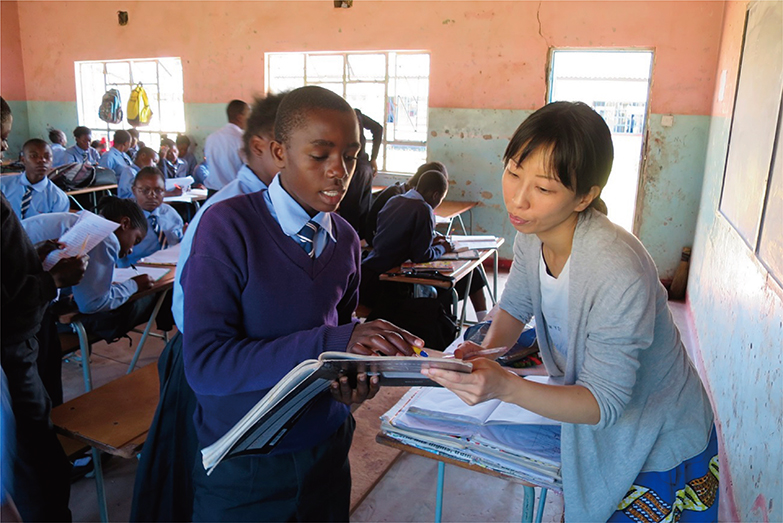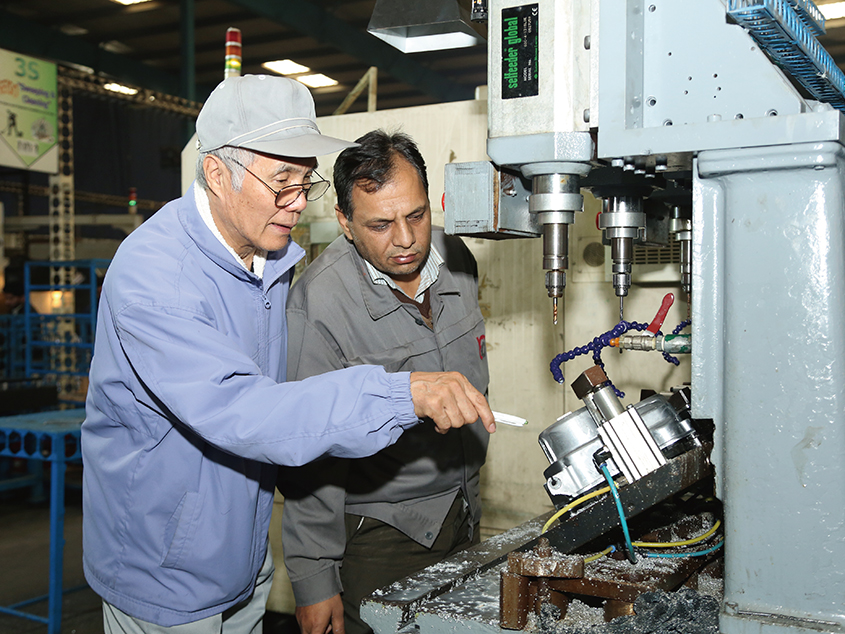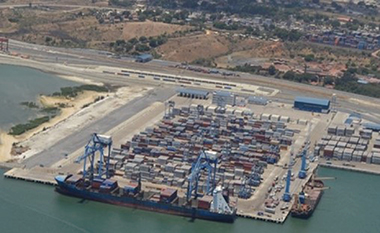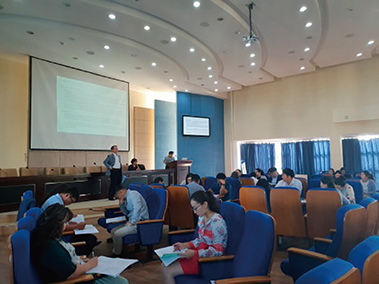Part II Measures for Each Priority Issue

Ms. Shino Ichikawa, a Japan Overseas Cooperation Volunteer (science education) at a school in Zambia, checking a student’s note book at the end of the class (Photo: JICA)

A JICA expert providing on-site guidance on a production line in an automobile factory on the outskirts of Lahore, Pakistan (photo: JICA)
Hereafter, in relation to Japan’s development cooperation (Note 1) around the world, Japan’s recent efforts regarding three key issues will be introduced. These three issues are “1. Cooperation aimed at achieving ‘quality growth,’” “2. Sharing universal values and realizing a peaceful and secure society,” and “3. Promoting efforts to address global issues and human-centered development.”
1 Cooperation Aimed at Achieving “Quality Growth”
In order to enable developing countries to achieve economic growth aimed at self-reliant development, it is essential to aim for not only quantitative economic growth but also “quality growth.” Development would be “quality growth” that is “inclusive” where the fruits of growth are shared with the society as a whole, leaving no one behind. It must also be “sustainable” in that growth can be sustained in harmony with society and the environment, and “resilient” against economic crises, natural disasters and other shocks.
These are some of the challenges that Japan tackled in its postwar history. Japan is striving to make use of its own experience, expertise and technology, as well as lessons learned in order to provide assistance to realize “quality growth” in developing countries.
(1) Development of Industrial Infrastructure and Industries, and Economic Policy
In order to achieve “quality growth,” it is important to improve the socio-economic infrastructure that serves as the foundation for the development of developing countries. Moreover, it is crucial that the private sector plays a central role, and boost private sector activities, such as the development of industries and the expansion of trade and investment.
In developing countries beset by numerous challenges, it can sometimes be difficult to develop capacities or set in place an environment for promoting trade and attracting private investment. Thus, support from the international community is required.
■Japan’s Efforts
●Quality Infrastructure
Japan develops quality infrastructure that leads to quality growth in developing countries and regions, in line with their economic and development strategies, and trains human resources to manage and operate this infrastructure. Japan’s strength lies in developing infrastructure that is truly contributory to “quality growth” in developing countries, which includes technology transfer and job creation.
The “G7 Ise-Shima Principles for Promoting Quality Infrastructure Investment,” which was agreed at the G7 Ise-Shima Summit in 2016, is positioned as the first step towards sharing the recognition on the basic elements of “quality infrastructure investment,” or investment for the development of infrastructure that contributes to “quality growth.” The importance of the specific elements set forth in the Principles ((i) economic efficiency in view of life-cycle cost, safety and resilience against natural disaster, (ii) job creation, capacity building, and transfer of expertise and know-how, (iii) social and environmental considerations, (iv) ensuring alignment with economic and development strategies, and (v) enhancing effective resource mobilization) was shared at subsequent meetings, such as the G20 Hangzhou Summit, the 6th Tokyo International Conference on African Development (TICAD VI), the East Asia Summit, and the APEC Leaders’ Meeting.
Moreover, in its own contribution to infrastructure investment in line with the “G7 Ise-Shima Principles for Promoting Quality Infrastructure Investment,” Japan is promoting quality infrastructure investment based on the “Expanded Partnership for Quality Infrastructure,” under which it would provide a total of approximately $200 billion in quality infrastructure investment to projects worldwide, over five years from 2017. Additionally, at the TICAD Ministerial Meeting in 2018, Foreign Minister Taro Kono outlined an intention to support enhanced connectivity throughout the entire African continent and beyond, through “quality infrastructure investment.”
Furthermore, Japan is working with organizations such as the Organization for Economic Co-operation and Development (OECD) and the EU in order to promote the international standardization of quality infrastructure investment, including the aspects of openness, transparency, economic efficiency and the financial soundness of target countries. In April 2018, Japan co-hosted the “Seminar on Promoting Quality Infrastructure” in Tokyo together with the OECD Development Centre, during which participants engaged in lively discussions about quality infrastructure. During the high-level week of the UN General Assembly in September that same year, Japan co-hosted the UN General Assembly High-Level Side Event on “Promoting Quality Infrastructure” with the EU and the UN with the attendance of Foreign Minister Kono, leading international discussions on “quality infrastructure.” In the same month, Japan co-hosted the “ASEM Seminar on Sustainable Connectivity and Quality Infrastructure” in Tokyo together with the EU, under the Asia–Europe Meeting (ASEM), and in October, at the 12th ASEM Summit Meeting, Prime Minister Abe stated, based on the results of the seminar, that strengthening connectivity is essential for further development of Asia and Europe, and that in order to achieve this, “quality infrastructure” should become the international standard. Moreover, in September of the same year, Japan co-hosted a seminar on “quality infrastructure investment” in Tokyo together with the OECD and World Bank, at which, there was an in-depth discussion regarding the role that “quality infrastructure investment” should play in shrinking the supply-and-demand gap in infrastructure, as well as its component elements and the anticipated results. Moving forward, Japan aims to continue promoting initiatives toward the international standardization of quality infrastructure.
●Kenya
Mombasa Port Development Project (Phase 1), Mombasa Port Area Road Development Project (Phase 2)
Loan Aid (Phase 1: March 2012 – March 2016), (Phase 2: January 2013 – (ongoing))

Expanded Mombasa Port, through development cooperation by Japan (Photo: Toyo Construction)
As globalization progresses, the role of marine transportation in global trade is becoming extremely large. In Kenya, the amount of cargo handled at Mombasa Port, the largest logistics base in the East Africa region, has grown to approximately 100 times the amount dealt with by air. Thus, it can be said that the marine shipping industry is supporting the economic activity and the livelihoods of people in Kenya.
Also, since the African continent has many inland countries that do not border the sea, Mombasa Port plays an important role, not only for the country where the port is located, but also for the distribution of goods to these inland countries. As approximately 30% of the cargo handled by Mombasa Port is transported to inland countries such as Uganda, South Sudan and Rwanda, the port serves as a gateway to them.
The amount of cargo handled at Mombasa Port has been increasing year on year due to population and economic growth. While the amount of cargo is expected to continue growing steadily, the port was facing issues in dealing with the increase in cargo with its existing facilities alone. Given this situation, Japan has been supporting the expansion work of the port, so that it will be able to handle an increasing amount of container cargo smoothly. This work has substantially increased the amount of container cargo that can be handled at Mombasa Port. As of 2017, the amount had risen to 1.5 times that of 2011.
Also, in order to ensure the smooth distribution of goods over the entire region, it is important not only to expand the port facilities, but also to improve the roads that support distribution from the port. Therefore, in addition to the Mombasa Port expansion work, Japan is supporting the improvement of roads to serve as major arteries in the Mombasa region.
Through such development cooperation for infrastructure improvements, Japan is contributing to the economic development and increased standards of living not only in Kenya, but in countries across East Africa.
●Improving the Trade and Investment Environment
Japan utilizes ODA and Other Official Flows (OOF)* to support the development of small and medium- sized enterprises (SMEs), transfer of Japan’s industrial technology, and formulation of economic policies in developing countries. In addition, Japan supports the development of the trade and investment environment and economic infrastructures in order to enhance the export capabilities and competitiveness of developing countries.
Approximately two-thirds of the World Trade Organization (WTO) member states are developing countries, and the WTO emphasizes the significance of promoting their development through their participation in the multilateral free trading system. Japan has contributed to the trust fund set up within the WTO with an aim to strengthen the capacity of developing countries to engage in trade negotiations and participate in the global market, and to raise their ability to implement the WTO agreements.
With regard to access to the Japanese market, Japan has implemented the Generalized System of Preferences (GSP) for developing countries, which applies lower tariff rates to products from developing countries, and duty-free quota-free access* for the Least Developed Countries (LDCs)*. These schemes are intended to encourage Japan’s import of products from developing countries including the LDCs. Moreover, Japan actively promotes Economic Partnership Agreements (EPAs)* and strives to create an environment for economic growth in developing countries through liberalization of trade and investment.
Discussions regarding “Aid for Trade (AfT)”* have intensified in various international organizations, including the WTO and the OECD, as a means of further promoting support from developed countries, such as that of Japan. Japan has provided funds for the development of transportation networks, including ports, roads, and bridges, as well as for projects to construct facilities such as power plants and power grids, all of which are vital for developing countries to engage in trade, and implemented technical cooperation in trade-related areas, including training of customs’ officials and intellectual property rights experts.
Furthermore, Japan provides assistance to small-scale production groups and small companies in developing countries for the “One Village, One Product Campaign.”* In addition, Japan supports developing countries in attracting private sector investment by identifying challenges unique to those countries and recommending measures to promote private investment.
The implementation of the “Trade Facilitation Agreement (TFA),”* which entered into force in February 2017, it is expected to improve the challenging situations Japanese companies frequently face at export destinations, such as lack of transparency, and arbitrary application of trade procedures, and to boost trade and other economic activities by Japanese companies, which not only export finished goods, but also develop supply chains on a global scale. In addition, its implementation is also expected to help developing countries to expand trade and investment by reducing the trade transaction costs, prevent illegal exports, and improve the collection of customs duties.
●Support for Mobilization of Domestic Private-Sector Resources
In order to enable developing countries to achieve quality growth by resolving various development issues under their ownership, it is critical that developing countries ensure the necessary development funds in the form of tax revenue collection or others with their own capacities. This is known as “domestic resource mobilization.” Its importance has been noted at the discussion fora of the UN, OECD, G7, G20, International Monetary Fund (IMF), and Multilateral Development Banks (MDBs). This issue is also brought up in the “2030 Agenda for Sustainable Development (2030 Agenda).”
Japan, together with the international organizations and other entities concerned, has been contributing to discussions regarding domestic resource mobilization, and provided relevant support to developing countries. For example, Japan proactively provides technical cooperation to developing countries for improving their tax administration. In 2018, Japan dispatched National Tax Agency personnel as trainers on topics including tax investigation, international taxation, tax collection, and staff training, to Cambodia, Indonesia, Laos, Myanmar, Malaysia, and Viet Nam.
With regard to programs implemented with international organizations, Japan has, for example, assisted the development of the “OECD Global Relations Programme” for more than 20 years. This Programme dispatches experts in the relevant fields of tax treaties (Note 2) and investigation of the taxes of multinational enterprises to developing countries to conduct seminars and lectures to deepen the countries’ understanding of taxation systems and tax enforcement. In addition, Japan provides cooperation on the human resources, expertise, and financing for technical assistance provided by the IMF and Asian Development Bank (ADB) in the field of taxation, including domestic resource mobilization, thereby contributing to strengthening capabilities in the field of taxation in developing countries including Asia.
In recent years, public opinion has taken an increasingly critical view towards the involvement of the wealthy class and multinational enterprises in international tax avoidance. In this regard, the World Bank and ADB, for example, have introduced a system for examining projects that use regions recognized as lacking in tax transparency, with issues such as insufficient effective tax information exchange, as intermediate investment regions when formulating private sector investment projects, including the cancelation of the formation of such projects. Investment through MDBs is one of the important tools for the growth of developing countries. Hence the importance of support to enhance the transparency of taxes in developing countries is increasing, from the perspective of the provision of development funds as well.
Finally, it should be pointed out that the outcomes of the OECD/G20 BEPS project* are also important for the sustainable development of developing countries. Cooperation among countries to implement the outcomes of this project will improve the transparency of companies and governments, and appropriate taxation will become possible in places where economic activities take place. Developing countries will be able to respond to the tax avoidance of multinational enterprises appropriately, and impose and collect tax properly in their own countries, and at the same time, their tax systems and tax administration will be in line with international standards, and a stable, highly predictable, and attractive investment environment will be created for companies and investors. At present, more than 120 countries and regions, including developing countries, are participating in the framework that implements measures recommended under the BEPS project.
●Mongolia
Project for Enhancing Tax Collection Operation and International Tax Issues of Mongolian Tax Administration Phase 2
Technical Cooperation Project (January 2017 – (ongoing))

Group work at a training course on international taxation (Photo: JICA)
At the start of the 1990s, Mongolia made the transition from a socialist economy to a market economy. However, with the advancement of many foreign-affiliated companies and international capital into the country, Mongolia has faced challenges in improving systems and training human resources relating to international taxation, and establishing an efficient tax collection system. As a part of its support for Mongolia’s transition to a market economy system, Japan has provided assistance to strengthen the functions of the Mongolian Tax Administration, such as establishing a collection system and strengthening tax administration, since 1998.
The ongoing “Project for Enhancing Tax Collection Operation and International Tax Issues of Mongolian Tax Administration Phase 2” supports the improvement and development of structures and systems relating to taxation, tax payment and collection, which were previously unclear, in order to maintain the country’s taxation rights, while responding to international demands to take countermeasures against tax avoidance by multinational corporations. A reform bill was formulated with support from this project, and is currently under deliberation by the Mongolian parliament. If the bill is approved, it is expected to lead to increased tax revenue under an appropriate tax collection system.
The project has also supported the creation of a database of taxable individuals, the establishment of a notification center* for non-payers of small amounts, and training for tax officials to strengthen their ability to collect tax, in order to make efficient demands on non-payers. From November 2013 to January 2019, training was implemented for a total of 824 tax officials in Mongolia, and thanks to the notification center, it was made possible to collect as much as 20.7032 billion tögrög (approximately 887.5 million Japanese yen) from small sums of unpaid taxes, from its founding in March 2016 to November 2018.
Japan will continue to make a contribution to strengthening the Mongolian financial base, so that the people can live secure lives, as well as establishing a fair and impartial tax administration service, to benefit Mongolian tax payers and Japanese companies doing business in the country.
* Demanding the fulfilment of debt obligations to debtors
●Finance
A sound and stable financial system, coupled with smooth financial and capital markets, forms an essential foundation for the sustainable economic development of developing countries. As financial globalization advances, it is pivotal that financial systems in emerging countries are properly established and that assistance is provided for the development of sound financial markets.
In February, March, August, and October 2018, the Financial Services Agency (FSA) invited officials in banking, securities, and insurance regulatory authorities from developing countries in Asia and others, to attend a training program conducted by FSA officials and etc. The training program covered areas such as the initiatives, as well as regulatory and supervision systems in Japan’s banking, securities, and insurance sectors respectively.
- *Other Official Flows (OOF)
- OOF refers to flows of funds to developing countries from governments, which are not considered as ODA, because their main purpose is not development. Examples include export credit, direct investment by governmental financial institutions, and financing to international organizations.
- *Least Developed Countries (LDCs)
- LDCs are countries classified by the United Nations to be particularly lagging in development compared to other developing countries, based on their income levels. LDCs meet certain criteria, including per capita gross national income (GNI) of $1,025 or less between 2016 and 2018. As of 2018, there are 47 countries: 7 in Asia, 2 in the Middle East and North Africa, 33 in Sub-Saharan Africa, 1 in Latin America, and 4 in Oceania.
- *Duty-free quota-free access
- Duty-free quota-free access refers to measures implemented by developed countries to make products imported from LDCs tariff free and without any import quotas. Japan has expanded the number of applicable products under these measures, and approximately 98% of products exported from LDCs to Japan can be imported under such conditions.
- *Economic Partnership Agreement (EPA)
- EPAs are comprehensive economic agreements with specific countries, or regions, which include not only free trade agreements (FTAs) that stipulate the liberalization of trade in goods and/or services such as the reduction/elimination of tariffs, but also a wide range of areas, such as movement of people, investment, government procurement, and bilateral cooperation. These agreements are expected to further vitalize trade and investment between countries and contribute to economic growth.
- *Aid for Trade (AfT)
- AfT is assistance provided to developing countries to improve trade-related capabilities and to develop infrastructure for the purpose of achieving economic growth through trade in the recipient countries, within the multilateral trading system under the WTO.
- *One Village, One Product Campaign → See also “Stories from the Field”
- The One Village, One Product Campaign is an initiative launched in Oita Prefecture, Japan in 1979, aimed at creating jobs and revitalizing the local community by developing unique local products through the utilization of local resources and traditional techniques. Such initiatives are also utilized abroad. In this Campaign, efforts are being made to dig up handicrafts, textiles, toys, and other attractive products that display the unique ethnic characteristics of developing countries in regions such as Asia and Africa, and reach out to a wider range of people, thereby supporting the expansion of exports of products from developing countries.
- *Trade Facilitation Agreement (TFA)
- The Trade Facilitation Agreement (TFA) provides for the simplification and enhanced transparency of customs procedures aimed at trade promotion. The Protocol to make the TFA a part of the WTO Agreement in February 2017 was adopted at a special meeting of the WTO General Council in 2014. It entered into force upon its acceptance by 110 WTO member states, which corresponds to approximately two-thirds of all of the WTO member states. Japan accepted the Protocol in 2016. The TFA is the first newly-created multilateral agreement that has gained the participation of all WTO member states, since its founding in 1995. According to the WTO, full implementation of the TFA could reduce the trade costs of member states by an average of 14.3%, and increase global export of goods by over $1 trillion.
- *OECD/G20 BEPS Project
- Base Erosion and Profit Shifting (BEPS) refers to the issue of multinational enterprises’ aggressive tax planning measures that exploit gaps and loopholes in international tax systems, including tax treaties, in order to intentionally reduce the tax burden for economic activities that should have been taxed. In order to address this issue, the BEPS Project was launched in June 2012, by the OECD’s Committee on Fiscal Affairs (led by a Japanese Chair until the end of 2016), with the aim of ensuring fair competition and making international taxation rules conform with the situation of the global economy and company trends, as well as reviewing international taxation rules across the board in order to raise transparency among all governments and global companies.
Under the BEPS project, the BEPS Action Plan was presented in 2013, and the BEPS Final Reports were released in 2015. In 2016, the “First Meeting of the Inclusive Framework on BEPS” was held in Kyoto to kick-off the BEPS implementation phase (“post BEPS”), and Japan led the discussions in cooperation with the OECD, developing countries, and relevant international organizations to ensure that the outcomes of the BEPS Project are shared widely in the international community. As of February 2019, more than 120 countries and regions are participating in the Inclusive Framework on BEPS.
Japan has also actively participated in negotiations for a “Multilateral Convention to Implement Tax Treaty Related Measures to Prevent Base Erosion and Profit Shifting (BEPS MLI),” and the Convention was opened for signatures at the end of 2016. A signing ceremony for the Convention was held in June 2017, wherein Japan signed the Convention as well. As of February 25, 2019, 85 countries and regions have signed the Convention, and 21 including Japan have concluded agreements.
- Note1 : Here, the term “development cooperation” refers to “international cooperation activities conducted by the government and related organizations for the main purpose of development in developing regions,” including ODA and other cooperation conducted in collaboration with public-private financing and activities.
- Note2 : Bilateral treat for avoiding the double taxation on income, as well as preventing the avoidance or evasion of taxes on income
